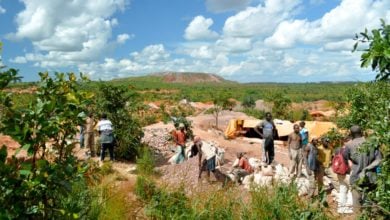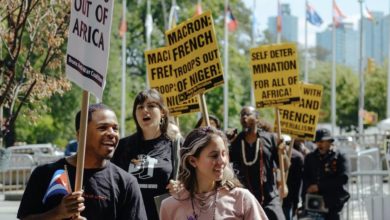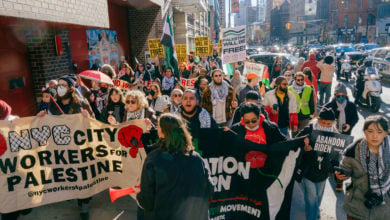The dictatorship of Tunisian
president Ben Ali has fallen, overthrown by a popular rebellion against
corruption, unemployment and state repression.
The U.S.-supported Tunisian
dictator fled Tunisia Jan. 14, leaving the prime minister as head of
government. He too was quickly brought down by the will of the people, less
than 24 hours later. The fall of these two leaders of a 23-year dictatorship is
a victory for the Tunisian people.
The protests that grew in
intensity over the last four weeks were sparked by the resistance of a single
young man to the injustices of police repression and to deep poverty and
unemployment.
Mohamed Bouazizi, 24 years old,
had a college degree but, unable to find work, was eking out a living selling
fruits and vegetables from a street stand. The police routinely harassed him
and closed the stand, claiming he had no license. In protest, he committed suicide
by setting himself on fire outside of city hall.
Tunisia suffers an official
unemployment rate of 14 percent. The actual figure for unemployment is much
higher. The official unemployment rate for young people ages 15 to 24 was 31
percent in 2005 (the most recent data available). The figures have not changed
much since 2005; the official unemployment rate at that time was 13.8 percent.
The problems of high
unemployment and underemployment—a direct result of IMF and EU constructed
neoliberal policies—have been compounded by the corruption and repressive
nature of the Ben Ali regime.
Ben Ali came to power in 1987.
He named himself president after Habib Bourguiba was declared mentally
incompetent to rule by a group of doctors.
Habib Bourguiba is a historic
figure in Tunisian history. Bourguiba, a radical, led the revolutionary
movement against the French colonizers that was victorious in 1956.
His government instituted
progressive economic and social reforms. The fact that 99 percent of boys and
girls attend elementary school today in Tunisia is just one legacy of this
period. However, the Bourguiba government did not represent a revolutionary
transformation of society. Tunisia continued to develop as a capitalist country
independent of the parasitical colonial regime but led by a nationalist
capitalist class. There were many contradictions in the Bourguiba government.
Ben Ali came from within the
Bourguiba government. He was trained in elite French and U.S. military
academies before joining the resistance to the French colonial regime.
Following the 1956 independence movement, Ben Ali served in a number of posts
in government. In 1984, Bourguiba named him chief of military security, and
then in 1987 he was named prime minister. In the years leading up to the 1987
bloodless “coup,” Ben Ali was widely recognized as friendly to both the former
colonizers, the French, and the current imperialist superpower, the United
States.
The U.S. capitalist class, in
particular, but the French as well, were still engaged in a fierce battle to
overthrow the Soviet Union and dominate the world’s resources and people.
Tunisia, under the direction of Ben Ali, was now ripe for the so-called free
market policies that imperialists had attempted to impose across Africa, Latin
America and Asia.
In 1990, the U.S. Congress
authorized a State Department request for an increase of funds to Tunisia to
support the new policies. Since then, U.S. military aid alone has totaled
nearly $350 million. More recently, the U.S. government placed the regional
headquarters of the Middle East Partnership Initiative, a program to bring
about political change in the Arab world, in Tunisia’s capital city.
These measures—which include
the deliberate destruction of labor and environmental protections, the lowering
or elimination of tariffs that protect homegrown products and the privatization
of public services—are directly responsible for the consistently high rate of
unemployment in Tunisia over the last 15 to 20 years.
Popular movement may be decisive factor
What is clear in Tunisia as of
this writing is that the people have won a great victory in forcing out
successive members of the dictatorship. What is less clear is what will happen
as events continue to move at a rapid pace.
There is a good deal of fear
among the ruling classes of the immediate region and the imperialists in the
United States and Western Europe that the crisis in Tunisia will spread.
Tunisia’s neighbors, like Algeria, suffer from even higher rates of
unemployment. The governments of the region that are friendly to the disastrous
policies of neoliberalism imposed by the IMF and World Bank and to the United
States government may face increased resistance from their own people.
In Tunisia, a curfew has been
imposed, people are confined to their houses and food is becoming scarce. Armed
militias of young men are apparently carrying out repression in poor and
working-class neighborhoods, reportedly supported by members of Ben Ali’s
regime, although those reports are not confirmed. There is some indication that
these groups too are meeting the resistance of popular organizations. In
Ariana, a militia was surrounded and disarmed by a group of neighbors.
Tunisia’s third president in 48
hours, Fouad Mebazza, is required by the constitution to hold elections in 45
to 60 days. But it is unclear whether he will be able to overcome the power
vacuum that exists.
The popular movement, which has
lacked a clear and organized leadership that would be capable of taking power
in the interests of the vast majority of people, does hold, for the moment, the
most powerful position in the country—regardless of constitutional protocol.
They have ousted two presidents in quick order and are looking for some glimmer
of resolution to the serious problems of poverty and unemployment.





